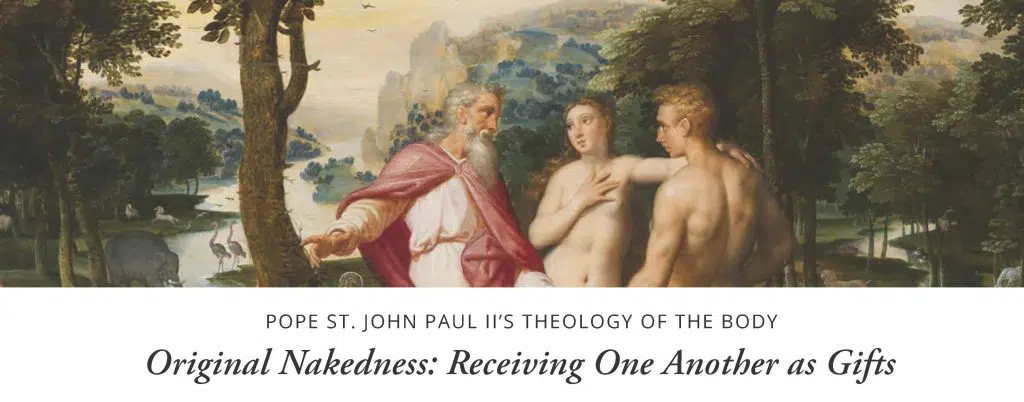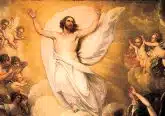Original Nakedness: Receiving One Another as Gifts

This article is part of an ongoing series on Pope St. John Paul II’s “Theology of the Body” (TOB).
Last month, I introduced Pope St. John Paul II’s concept of original nakedness. In that reflection, we saw that our first parents “were both naked, and were not ashamed” (Gen. 2:25). According to the saintly pope, this lack of shame corresponded to a fullness of interior freedom they felt in one another’s presence. By virtue of original innocence, by which man and woman were untainted by sin and filled with God’s grace, they were able to behold each other “with all the peace of the interior gaze” (TOB 13.1). The pope was referring here to a capacity to “see” each other not only with physical eyes, but also – to borrow an expression from St. Paul – with the eyes of the heart (cf. Eph. 1:18). What precisely is this “interior gaze” or “heart vision” through which our first parents beheld each other? And what does it have to do with us?
Physical eyes see the exterior of things: light and dark, shape, colors, texture, movement, etc. When we look at one another only with this limited form of vision, we merely see the exterior of the body and fail to see the interior reality of the person. This can lead us to treat the person as just one more object among so many in our environment. Like any other object we see, we begin to evaluate this object based on what it can do for me. How useful is it? Will it gratify me in some way or give me pleasant feelings? Is it what I want?
To avoid this objectification of the person, our exterior vision needs to be guided and informed by a heart that “sees” the true value of things and is disposed to receive them with gratitude. Indeed, all of creation is a gift to man from our loving Creator and is meant to draw us back to Him. Everything that exists has a certain truth, goodness and beauty that reflects the infinite Truth, Goodness and Beauty that exist eternally in God. There is nothing in visible creation for which this is more true than the human person. Made in the image and likeness of God, possessing the capacity of self-awareness and self- determination, the human person is the most exalted creature in all of the visible world. A person is not just a “what” but a “who,” another “I” like me. Each person is entirely unique, a son or daughter of God set in a distinct, unrepeatable relationship with Him. A person is capable, through freedom and intelligence, of truly human activity. We discover all of this through the human body if we have the interior eyes to see it, for the body reveals the hidden, spiritual reality we call “person.” The body makes the person present and is the “place” of encounter with the person.
Our first parents instinctively saw the fullness of the dignity of the person revealed in each other’s bodies. Indeed, they saw all of creation as a gift given by their loving Father to be cherished and respected, most of all with one another. They beheld each other as embodied personal subjects and not as mere objects to be used. They intuitively knew that this body reveals a person who must never be used and always respected with awe and reverence. I can never “possess” another person or treat him/ her as a means to an end. This attitude filled their hearts and enlightened their eyes. This is why they could be “naked” and not feel “ashamed.” There was no danger or threat for them in being completely exposed (physically and spiritually) before each other. They were totally safe in each other’s person- affirming gaze.
For us, wounded as we are by sin yet redeemed by Christ, we have to work diligently to grow into this capacity to always “see” and affirm the person. Even then it is not fully attained in this fallen world where threats to our dignity abound and the effects of sin are never totally blotted out. Nonetheless, pondering original nakedness underscores the dignity of the person and points to the incredible respect that every human person, revealed by his or her body, deserves. It is only in letting this vision take root in our hearts that we can hope to experience a glimmer of the intimacy with God and others for whom we are created.
 Dr. Andrew Sodergren, MTS, PSY.D is a Catholic psychologist and director of psychological services for Ruah Woods. He speaks on the integration of psychology and the Catholic faith. He and his wife, Ellie, have five children.
Dr. Andrew Sodergren, MTS, PSY.D is a Catholic psychologist and director of psychological services for Ruah Woods. He speaks on the integration of psychology and the Catholic faith. He and his wife, Ellie, have five children.
This article appeared in the April 2022 edition of The Catholic Telegraph Magazine. For your complimentary subscription, click here













